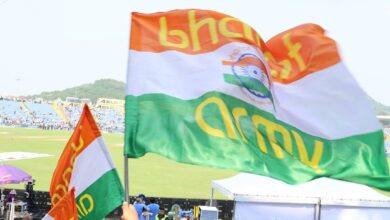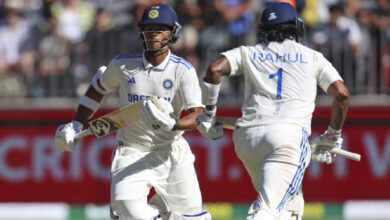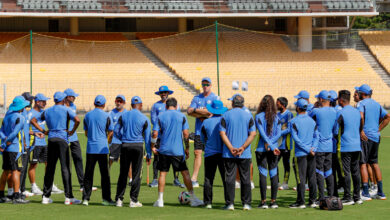Asian surge in World Cup: South Korea stun Portugal, follow Japan to round of 16

A NIGHT after Japan upended Spain and topped their group, neighbours South Korea pulled off another surprise, beating Portugal to advance to the round of 16 at the expense of Uruguay — and stretching the theme of the Asian surge in the World Cup in another night of wild drama.
It seemed a lost cause for South Korea against Portugal, comprising not only Criano Ronaldo but also an ensemble of Europe’s most valued players. The task seemed bleaker when Portugal scored as early as the fifth minute, through Lus Ricardo Horta.
For the next 20 minutes, Portugal could have scored several times but for the gumption of the Koreans who defended valiantly, putting everything on the line. The perseverance was rewarded when Kim Young-Gwon equalised in the 27th minute.
For the next 63 minutes, they had to score another goal, keep Portugal away from reclaiming the lead — and hope that group rivals Uruguay wouldn’t add to the two goals they had netted inside the first 32 minutes against Ghana in the other match. In the stands, the Korean fans, who had turned up in droves with those ubiquitous horns fitted to their heads, could be seen frantically checking the scores of the Portugal-Ghana game.
For a while, it seemed the night might not be Korea’s as a goal kept eluding them. But they did not give up, like the Japanese the other night against Spain. They kept storming the Portuguese goalmouth, and 31 seconds into stoppage time, found a spring of hope in this desert city.
The goal originated from their talisman Heung-min Son’s lung-busting run to the Portugal end. Once inside the Portugal post, he slipped in an inch-perfect pass to Hwang Hee-Chan, who was making the shadow run. The Koreans on the ground, in the dugout and stands, and probably in the country, leapt in joy.
But they had six minutes of added time to wade through and pray that Ghana would prevent Uruguay from nicking another goal. For the Ghanians in their grudge match against Uruguay, the next best thing other than winning was denying Uruguay a knockout spot. They defended fiercely and kept Uruguay at bay, making this the third time three teams from the Asian confederation are in the round of 16 (Japan, Korea and Australia, who is considered part of the Asian qualification system).
Their progress could be ascertained as a fluke. Korea played an organised game, compact in defence and precise in counterattacking. So did Japan, combative and physical, playing deep and direct latching onto quick counters and optimising their chances with laser-guided precision.
Late Thursday, Japan mustered just three shots on goals against Spain, and two of them were goals. Similar were the numbers against Germany earlier — they converted two of the four chances they got. Against Germany, they enjoyed 26 per cent ball possession; against Spain just 18. But still, when goal-scoring moments arrived they latched on. As their manager Hajime Moriyasu said later: “We have reached world standards.”
Korea’s coach Paulo Bento, who watched Friday’s match from the stands as he was red-carded for an outburst at the referee in their earlier game against Ghana, could repeat the words of his Japanese counterpart.
Long gone is the time when Asian teams were viewed condescendingly, for merely making the numbers. Japan has progressed thrice to the round of 16 in the five editions. Korea had reached the semifinals in the 2002 edition, though they were allegedly the beneficiaries of some horrendous refereeing. But no asterisk would be attached to their recent journey to the knockout, just like for Japan.
It should not be misconstrued that Asian teams benefited from playing in Asia. For, a case could be made then that Europe and Americans teams have always enjoyed home advantage as just three World Cups have been played in Asia and Africa.
Rather, it is a moment to appreciate the comeuppance of Asian football.
Both Japan and Korea have robust leagues, and have a legion of players playing in the leagues of Europe. Japan has 451; Korea has 330 abroad. Some of them are among the elite. Like Son, who is one half of Tottenham Hotspur’s deadly forward line. The match-winning Hwang is Wolverhampton Wanderers’ most trusted forward.
In their journey to the steep path of acclaim, they have shattered perceptions. Asian players are not just about twinkling feet and silken skills, but they are technical and physical players who can match their European and American counterparts in every aspect of the game. If the world has yet to notice and acknowledge their vault, they just need to tune into this World Cup.
Japan scalped Germany and Spain, with a combined haul of five World Cups, countries that have shaped tactics and philosophies of modern football. Korea stunned Portugal, the Portugal of Criano Ronaldo and Bruno Fernandes. Now, it’s time for Asian football to not just stand with their heads held high, but call the Europeans equals. In this World Cup, they have been more than equals.







